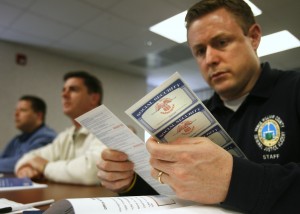Those with fake birth certificates find it’s easy to live the American dream

By Marianela Toledo | Florida Watchdog
MIAMI — It may be getting harder to sneak into the United States, but once you’ve arrived, getting fake documents in Florida is a piece of cake.
Counterfeit, altered or stolen birth certificates coming from Puerto Rico are the Holy Grail to Florida’s undocumented. With a phony birth certificate you can live the American dream. You can also enroll in school, land a job and get a driver’s license. (It has also been estimated that up to 40 percent of the passport fraud in the United States involves counterfeit or stolen birth certificates from Puerto Rico.)
SPOT THE FAKE: Document security fraud have been flourishing for years, in the State of Florida. People trying to get into the U.S. can easily obtain a fake Puerto Rico birth certificate, and apply for federal benefits, a community leader says.
The racket was made possible thanks to a law passed in 1917 by Congress, which granted U.S. citizenship to all Puerto Ricans. Now, desperate economic times together with eye-popping profits have created a black market where for as little as $25 a birth certificate can be bought and later resold for $5,000.
The fraud has become so common in Florida that four years ago, the Puerto Rican government passed a law that voided all birth certificates issued before 2010, reducing the value of birth certificates being sold on the black market.
All Puerto Ricans living on the island and in the United States had to obtain new birth certificates that included greater security features such as counterfeit proof paper with special seals and motifs to stop counterfeiters from duplicating the documents.
But the new law hasn’t done much to curb fraud.
With 4.9 million Puerto Ricans, according to the last official count, living in the United States and another 3.7 million residing in Puerto Rico, “the numbers just don’t add up,” said Elizabeth Cuevas-Neunder, a Puerto Rican running for governor in the republican primaries.
“Every day 100 people from Puerto Rico come to live here in Florida,” she said. “We don’t have enough population (referring to the number of people actually born in Puerto Rico) to have all those people coming.”
The discrepancies are staggering. Security Alliance reports that in 2008, 45,622 children were born in Puerto Rico. But in that same year, 860,000 certified copies of birth certificates were issued by the Office of Vital Statistics. Many of these official copies were used to enroll into school, join sports leagues and church groups.
Cuevas said there are a lot of people living in Puerto Rico who don’t have the means to leave.
“There are the children, and very poor people that just can’t afford leaving the island,” she said. “So how is possible that all those people are coming?”
She said Puerto Rico’s struggling economy has allowed the birth certificates black market to flourish, and that when given the chance to make a few extra dollars, some Puerto Ricans opt to sell their identities to the highest bidder.
Puerto Rico’s new law may have been well-intentioned, but she said it didn’t go far enough. “The law approved in 2010 doesn’t work, because if you already have a (fraudulent) birth certificate you can renew it online or by email. Nobody is certifying that you are the person you say you are.”
While America looks to the borders to control illegal immigration, some say the focus should be on the thousands of fake green cards, Social Security cards and birth certificates.
Dave Caulkett, vice president of Floridians for Immigration Enforcement, a right-leaning organization advocating document security, agrees fraudulent use of documents and duplication doesn’t get the attention it should in Florida.
“Document security is the grease that allows illegal immigration to flourish,” he said.
Florida is third among states with the most illegal immigration-related document fraud and identity theft, and he said the state has done nothing to solve the problem.
“One of the reasons why they don’t want to stop fraudulent documents,” said Caulkett, “is because businesses wants cheap workers. There is a crackdown on financial fraud, but if you have a false Social Security number they don’t do anything because they want to allow illegal immigration to continue.”
Caulkett said his group went to Florida Attorney General Pam Bondi, and “she wouldn’t do anything.”
Florida Watchdog contacted Bondi’s office and her staff responded by sending us an email exchange between Caulkett and Bondi’s office. In the email, Caulkett asked Bondi to endorse E-Verify language of 2011 bill HB7089, and said she never responded to the request to enforce state identity theft statutes.
“Regarding legislation that would require all employers, public and private, to use E-Verify system, we encourage you to contact your legislative delegation to convey your views,” Bondi’s office responded. “As a part of the executive branch of government, the Attorney General does not vote on or sponsor bills before the Florida Legislature.”
Caulkett said unless fraud is targeting someone’s nest egg, authorities look the other way.
Meanwhile, the flood of undocumented aliens seeking new identities feeds a burgeoning fraudulent document industry. U.S. Immigration and Customs Enforcement targets large document fraud rings and the most brazen employers, but its resources are limited and stretched across multiple priorities.
As critical mass rapidly nears, ICE will have its hands full. State and local governments will need to adopt tougher laws to supplement federal efforts.
“For me,” said Cuevas, “the ideal would be to have some kind of card with fingerprints. That’s how my grandparents used to sign back in their days.”
Puerto Ricans aren’t the only ones the document seekers are targeting. Last year ICE arrested 20 Cuban imposters in Miami-Dade and Broward counties seeking immigration benefits. Posing as Cubans, the group hoped to gain the freedom and benefits granted to Cuban nationals seeking refuge in the United States.
Contact Marianela Toledo at Marianela.Toledo@FloridaWatchdog.org or on Twitter @mtoledoreporter.







